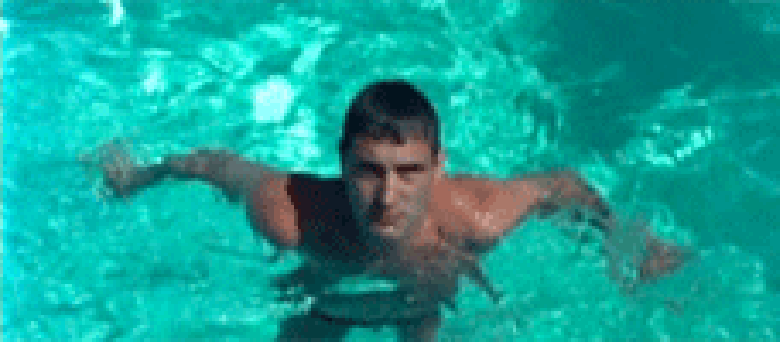Reviews
John Paizs
Canada, 1981
Credits
Review by Rumsey Taylor
Posted on 23 June 2010
Source DVD screener
Related articles
Features
92YTribeca Film Series: Crime Wave
Features
An Interview with John Paizs
Reviews
Top of the Food Chain
Reviews
Crime Wave
A relaxed, practiced narrator summarizes the images of a Greenland springtime. These are consistent with those of any peaceful, manicured suburb: two boys playing catch; neatly mowed, fenced in yards; and swimming pools. The narrator continues:
Ah, springtime: the season of love. No one is beyond its powerful spell, and all the young of Greenland are out and about doing what comes naturally. All, that is, except for one.
The “one” in question is the lowly Nick, portrayed by director John Paizs, and who utters nary a word throughout the film. He’s flanked by his prototypically happy family: his proud father, his mother and sister - who are preparing burgers for the afternoon cook out - and his brothers. The day’s activities commence with the removal of the tarpaulin off the backyard pool, and Nick stands over it hesitantly. We’re not precisely certain why he’s at first reluctant to dive in, but he’s clearly perturbed by the entry of his boisterous family and friends into the heretofore isolated backyard.
Springtime in Greenland is the first of a trio of short films by Paizs, including Oak, Ivy and other Dead Elms and The International Style, each of which features Nick as the silent protagonist. I’ve not seen the latter two, but Springtime is nonetheless a clear precedent to the themes, characterizations, and overall tone of Paizs’ esteemed 1985 feature Crime Wave, which also centers on Paizs as a silent protagonist (there renamed Steven). In the later film, the character’s creative frustrations and desire for inspiration are clearer and, furthermore, he achieves some matter of resolution. Springtime in Greenland is less of a narrative in this sense, more of a snapshot than it is a conclusive story, but in it - Paizs’ second film - the seeds of much of his later work are sown.
Paizs’ work possesses a distinctive aesthetic, characterized by illustrated title cards and end credits, and cherubic orchestral scores, not unlike those of old television programs. This lends his films an immediate nostalgic quality, even though their scenarios aren’t apparently situated in an older time period. Paizs creates such an idyllic air that the greatest tragedies in his films are ones that would be overlooked in a more contemporary, less stylized scenario. When Nick is reluctantly recruited into a diving match, he engenders our sympathy—not for him to win this frivolous competition, but for him to achieve his idea of comfort in a place in which any notion of “new” seems to be tacitly prohibited.
We don’t do comments anymore, but you may contact us here or find us on Twitter or Facebook.



